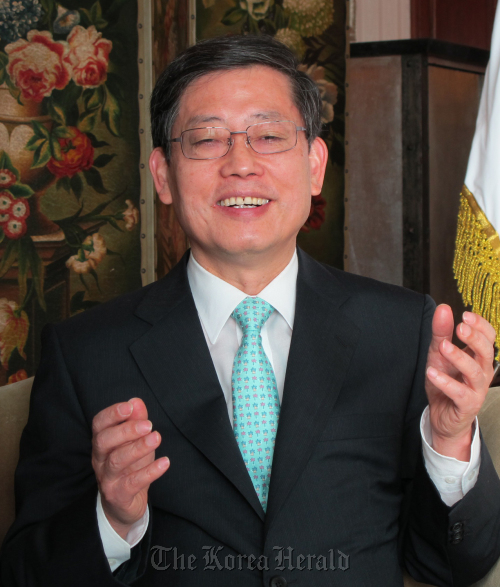MONTEVIDEO (Yonhap News) ― South Korean Prime Minister Kim Hwang-sik on Wednesday cautioned against “welfare populism,” as domestic politicians from both ruling and opposition circles have competitively embraced populist tones in public welfare spending ahead of the presidential and parliamentary elections, both slated for next year.
“It is not desirable for politicians to engage in excessive debate on welfare,” Kim said in an interview with the Yonhap news agency held at a hotel in the capital of Uruguay, the last destination in his three-nation visit to South America, which already took him to Brazil and Paraguay.
“Welfare should not stem from populism. Our fiscal health should not be harmed by populism. There should be a balance between today and tomorrow,” said Kim, urging politicians to put top priority on the national future.
“It is not desirable for politicians to engage in excessive debate on welfare,” Kim said in an interview with the Yonhap news agency held at a hotel in the capital of Uruguay, the last destination in his three-nation visit to South America, which already took him to Brazil and Paraguay.
“Welfare should not stem from populism. Our fiscal health should not be harmed by populism. There should be a balance between today and tomorrow,” said Kim, urging politicians to put top priority on the national future.

The interview was arranged, as Kim marks his 100th day in office this weekend.
Kim’s remarks followed President Lee Myung-bak’s criticism of “welfare populism” in his New Year’s address early this week.
Park Geun-hye, a presidential aspirant of the ruling Grand National Party, last year presented a “Korean-style” welfare plan centered on providing tailored social services for each stage of life, furthering the nation’s welfare debate. The main opposition Democratic Party has stubbornly called for “universal welfare” to render free meals to all young students, free childcare and medical services.
The former chief of the Board of Audit and Inspection also strongly warned against the possibility that senior civil servants may try to read the minds of influential politicians without doing work in the remaining years of President Lee’s five-year term.
The government will tighten discipline among public officials by punishing those who try to form a link with influential politicians, and neglect their own duty.
“Public officials must do their best thinking that the president’s term still remains six to seven years, not two,” he stressed.
As for the recently renewed controversy over constitutional amendment, Kim said the change can be discussed naturally as many years have passed since it was last amended. But it is the job of politicians to decide whether and how to revise it, he said.
The present Constitution limits a president to a single five-year term to prevent long-term rule by one leader.
Advocates of the revision say the limit creates a presidential “lame duck” syndrome in which the president’s authority weakens in the latter half of the term as the power center shifts to the next administration.
Kim called for a parliamentary ratification of the free trade agreement with the U.S. in the first half of this year.
“I don’t understand why the opposition party keeps opposing a deal originated from the former government. Now situations have changed so a partial change was inescapable,” he said, referring to the DP, which was the ruling party when President Roh Moo-hyun signed the FTA in 2007.
He pledged more efforts to increase communication with opposition parties.

















![[KH Explains] Hyundai's full hybrid edge to pay off amid slow transition to pure EVs](http://res.heraldm.com/phpwas/restmb_idxmake.php?idx=652&simg=/content/image/2024/04/18/20240418050645_0.jpg&u=20240418181020)

![[Today’s K-pop] Zico drops snippet of collaboration with Jennie](http://res.heraldm.com/phpwas/restmb_idxmake.php?idx=642&simg=/content/image/2024/04/18/20240418050702_0.jpg&u=)